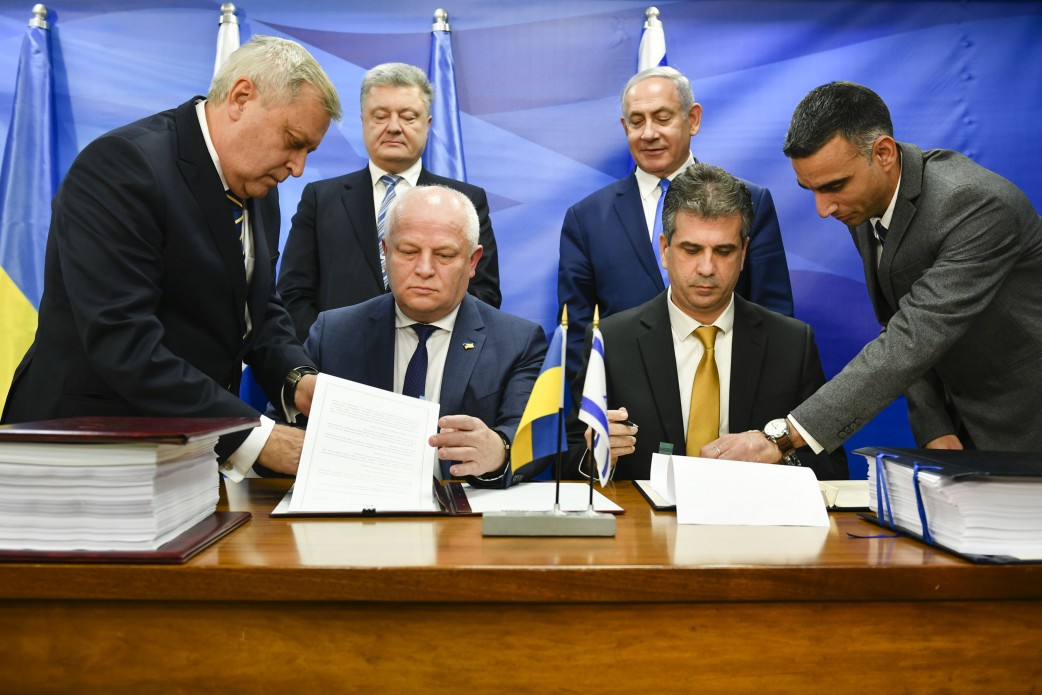Ukraine and Israel sign massive free trade agreement
Jerusalem Post | 22 January 2019
Ukraine and Israel sign massive free trade agreement
By Herb Keinon
Visiting Ukrainian President Petro Poroshenko hailed as “historic” the signing Monday of a free trade agreement with Israel that has been negotiated for the last 15 years.
“Today is a historic day in Jerusalem,” Poroshenko wrote on his Twitter account. “For many years hundreds of bureaucrats have attempted to prepare this agreement that will make the lives of our countries better.”
Poroshenko said the agreement will reduce the price of Ukrainian food in Israel and Israeli goods in Ukraine. The expectation is that this deal will bring trade between the two countries to over $1 billion within five years. This is Israel’s ninth free trade agreement.
The Ukrainian leader, facing elections on March 30 and currently lagging well behind in the polls, arrived on Sunday evening to take part in the signing of the agreement during a 30-hour visit to the country.
This is his third visit since taking office in 2014, and Netanyahu said before their meeting that this was a “testament to the strong relations” between Ukraine and Israel. This is particularly significant considering that Ukraine is currently engaged in a war with Russia, and Israel and Russia have a strong relationship.
Poroshenko said Israel and Ukraine are well coordinated regarding votes in the international arena, and thanked Israel for its support. In December, Israel voted with Ukraine on a UN General Assembly resolution that called for an end to Russia’s occupation and militarization of Crimea.
Since Ukraine infuriated Israel in 2016 by voting for an anti-settlement resolution in the UN Security Council, it has supported Israel in some key votes, including in UNESCO, and in the UN General Assembly in December when it voted to condemn Hamas.
The Ukrainian press reported that during a meeting with President Reuven Rivlin, Poroshenko asked the president to help facilitate the release of some two dozen Ukrainian sailors captured by Russia in November as they tried to pass through the Kerch Strait, a narrow water passageway separating Crimea from Russia.
Rivlin voiced appreciation for Ukraine’s stand against Hamas in the United Nations, and expressed the hope that Ukraine would also speak up on behalf of Israel in the UN Human Rights Council.
Rivlin thanked Poroshenko for his support in the fight against antisemitism, as well as for establishing a museum at Babi Yar, where more than 33,000 Jews were massacred during the Holocaust.
Poroshenko also met during the day with Ukrainian-born Knesset Speaker Yuli Edelstein, and Jerusalem Affairs Minister Ze’ev Elkin, also originally from Ukraine. Elkin played an important role in the free trade negotiations.
In addition to those meetings, Poroshenko visited the Church of the Holy Sepulchre and the Western Wall. Ambassador to Ukraine Joel Lion accompanied him to the Wall.
Poroshenko was originally scheduled to meet with Jerusalem Patriarch Theophilos III , but instead met Secretary-General of the Jerusalem Patriarchate Archbishop Aristarchos of Constantina.
Health reasons were cited for the cancellation of the meeting with the patriarch, although there is speculation that he canceled against the background of Ukraine’s recent break – after 800 years – from the Moscow Patriarchate and the creation of an independent Ukrainian Orthodox Church, for which Poroshenko is interested in gaining recognition.
On his website, Poroshenko said that at the Church of the Holy Sepulchre he prayed “for the cessation of Russian aggressions, [and] for the peace and prosperity of Ukraine.”
Poroshenko, during his meeting with Edelstein, expressed his hope that the Knesset would recognize the Holodomor – the man-made famine in Soviet Ukraine in 1932-1933, which killed millions of Ukrainians – as genocide. Ukraine and some 15 other countries – including Australia, Canada, Mexico and Colombia – recognize the Holodomor as genocide of the Ukrainian people carried out by the Soviet government. Five other countries have recognized it as a criminal act of the Stalinist regime.
Poroshenko referenced the famine during remarks he made at Yad Vashem. “Ukraine, as a state that suffered from the Holodomor of 1932-1933, when millions of Ukrainians were tortured by the communist Stalinist regime that committed genocide against the Ukrainian people, reverently keeps the memory of the Holocaust victims [alive] as well.”
"Today, on behalf of the Ukrainian people, I would like to bow my head in memory of every victim of the Nazi regime, in memory of the millions of victims of the Holocaust innocently tortured and killed in dreadful years of the Holocaust in Ukraine and around the world," he said. "We cherish the memory of them."






